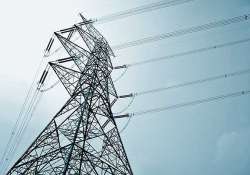DERC withdraws power tariff hike within 24 hrs
New Delhi: Facing severe attack from political parties, Delhi's power regulator DERC today withdrew the power tariff hike of up to seven per cent which was announced last night.The Delhi Electricity Regulatory Commission said the

New Delhi: Facing severe attack from political parties, Delhi's power regulator DERC today withdrew the power tariff hike of up to seven per cent which was announced last night.
The Delhi Electricity Regulatory Commission said the hike was rolled back "realising" that a number of power generation companies including NTPC, which supply electricity to the city, provided only part information about price of fuel such as coal and gas.
The DERC last night had announced re-introduction of the power purchase adjustment cost (PPAC) surcharge to effect an increase of tariff by up to seven per cent from Saturday.
BJP, Congress and Aam Aadmi Party had slammed DERC for raising the tariff, demanding an immediate roll back, but DERC today claimed that the decision to withdraw the hike was not due to criticism from the parties.
DERC chairperson P D Sudhakar said additional information on cost of producing of power from coal and gas-based power generating stations has been sought and a fresh decision on tariff will be taken within two weeks after examining the details.
"It has now been brought to the notice of the Commission that various generators including NTPC supplying power to Delhi have provided only part of the information regarding pricing of fuel and billing of power generated at their stations.
"Additional information has been called for, which is expected shortly which will have a direct bearing on the PPAC claims (by the discoms)," Sudhakar said.
Asked why the additional information on pricing of fuel and cost of power production was not sought earlier, he said the DERC had increased the tariff provisionally and now it felt that the detail costing of the generating stations should have been analysed before hiking the rates.
"We will take a decision on PPAC within next two weeks," said Sudhakar while claiming that decision was not revoked due to criticism from political parties.
Last night, the DERC had hiked the tariff by 7 per cent for consumers of BSES Yamuna Power and was fixed at 4.5 per cent for BSES Rajdhani. The hike for consumers of Tata Power Delhi Distribution Ltd was 2.5 per cent.
Asked about the issue, Lt Governor Najeeb Jung only said the hike has been withdrawn.
While hiking the power tariff by up to 7.5 per cent for domestic consumers, the DERC in July had withdrawn Power Purchase Adjustment Cost (PPAC) of around 8 per cent till October.
The regulator had introduced PPAC in 2012 to help the private power distribution companies recover additional cost on account of increase in coal and gas prices.
Delhi gets power from a number of gas and coal-based power generation plants.
The private power distribution companies, particularly, BRPL and BYPL, have been demanding significant hike in tariff, citing rise in power purchase cost.
The withdrawal of PPAC in July had resulted in marginal decline of tariff for the consumers, whose monthly consumption does not exceed 400 units.
According to DERC figures, the private discoms operating in the city have a revenue gap of a whopping Rs 19,500 crore.
Official figures show that around 80-90 per cent of total revenue of discoms goes into purchasing power from central and state government owned entities through long-term power purchase agreement, at rates determined by the central and state regulators.
The city has seen a series of hike in power tariff in the past two years.
The tariff was hiked by 22 per cent in 2011 followed by five per cent hike in February 2012. The tariff was increased by up to two per cent in May 2012 year and again by 26 per cent for domestic consumers in July 2012.
It was hiked by up to three per cent in February last year and again by five per cent in August last.
The cost of buying power has increased primarily on account of an increase in the input prices of raw material like coal and gas, officials said.